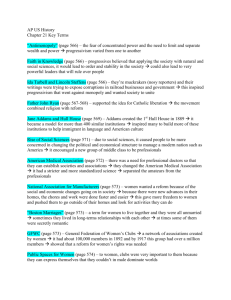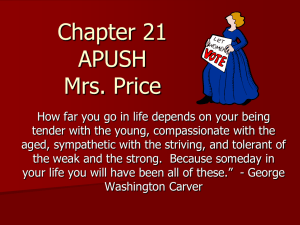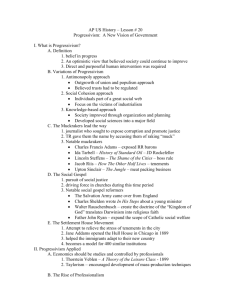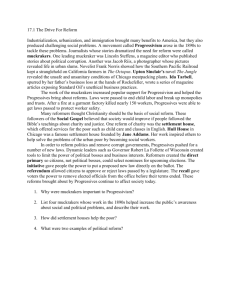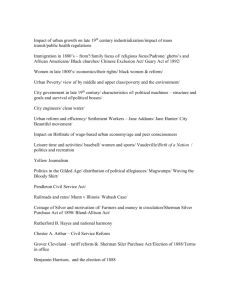The Rise of Progressivism - Ms. Smith's AP US History
advertisement
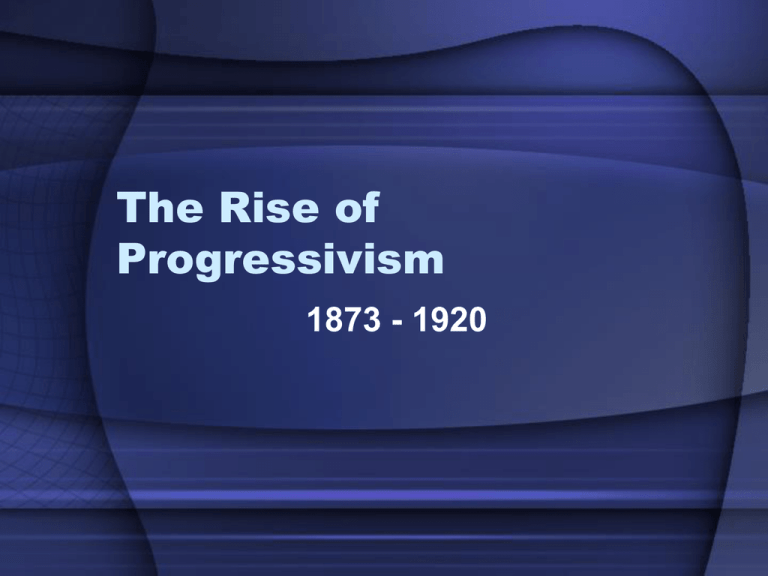
The Rise of Progressivism 1873 - 1920 Mulberry Street on New York City’s Lower East Side, Around 1900 Introduction • Rapid industrialization & urbanization created problems • Impose order on growing chaos • Optimistic vision Introduction, cont. • Society was capable of improvement • Growth & progress could not continue to occur recklessly • Intervention by govt. was necessary The Progressive Impulse • Spirit of antimonopoly • Importance of social cohesion • Organization & efficiency The Muckrakers and the Social Gospel • Reform-minded journalists • Social, economic, & political injustices • Exposing scandal & corruption • Targeted trusts The Muckrakers and the Social Gospel, cont. • Ida Tarbell & Standard Oil • Child labor • Railroads • Immigrant ghettoes • Labor unions • Governments The Muckrakers and the Social Gospel, cont. • Pursuit of social justice • Social Gospel mvmt. • Redeem nation’s cities • The Salvation Army The Settlement House Movement • Belief that environment shaped individual development • An improvement in the conditions of poor was needed The Settlement House Movement, cont. • Jane Addams & Hull House (1889) • Staffed by educated, middle class • Immigrant neighborhoods • Social work The Allure of Expertise • Building political & economic institutions capable of managing a modern society • Scientific management & Taylorism • Thorstein Veblen & A Theory of the Leisure Class (1899) The Professions • Expansion in # of administrative & professional tasks • “New middle class” valuing education & accomplishment The Professions, cont. • American Medical Association (1901) • Lawyers & professional bar associations (1916) • Guarding entry into profession • Prestige, status • Businessmen • Farmers Women and the Professions • Mostly excluded from emerging professions • Middle-class women entering professional careers • Settlement houses, social work • Teaching, nursing, librarians, academia Women and Reform • Prominent role of women in reform mvmts. is a significant feature of progressivism The “New Woman” • Almost all incomeproducing activity had moved out of home & into factory or office • Women having fewer children • Home & family less all-consuming The Clubwomen • Effort to extend influence beyond traditional sphere • Charlotte Perkins Gilman & Women and Economics (1908) Women’s Suffrage • Lrgst. reform mvmt. • Stanton & “natural rights” women deserved the same rights as men Women’s Suffrage, cont. • Some argued for distinctive female sphere • National American Woman Suffrage Association (NAWSA) • Carrie Chapman Catt & Anna Howard Shaw Women’s Suffrage, cont. • Suffrage would allow women to bring distinct virtues to social problems • WWI gave final push • Nineteenth Amendment (1920) Women’s Issues • Margaret Sanger and birth control • Lochner v. New York (1905) • Muller v. Oregon (1903) OR law barred women from working more than 10 hrs. a day • Brandeis brief The Assault on the Parties • Before society could be reformed, govt. would have to be • Parties as a source of corruption Municipal Reform • Impact of party rule most damaging in cities • Opposition to reform • City bosses, special interests, recent immigrants • Commissions & city mangers Statehouse Progressivism • Circumvent legislatures by increasing power of electorate • Initiative (submitting new legislation directly to voters) • Referendum (action of the legis. can be returned to the voters for approval) • Direct primary & recall Statehouse Progressivism, cont. • Robert M. LaFollette (WI) • Regulated RRs & utilities, regulate workplace & provided workmen’s comp., initiatives, referendums African Americans and Reform • Booker T. Washington • Founder of Tuskegee Institute (1881) • Immediate selfimprovement through education in agricultre & the trades vs. longrange social change African Americans and Reform, cont. • Atlanta Compromise (1895) • “Cast down your bucket where you are” • Encouraged African Americans to stop fighting segregation & second-class citizenship African Americans and Reform, cont. • W. E. B. DuBois • The Souls of Black Folk (1903) • Full university education • Aspire to professions • “Talented Tenth” • Immediate progress on civil rights African Americans and Reform, cont. • Niagra Mvmt. (1905) • End of segregation, voting rights, & equal ed. opportunities • NAACP • Fighting for equal rights Crusades for Order and Reform • Eliminate alcohol • Curb prostitution • Regulate divorce The Temperance Crusade • Necessary step in restoring order to society • Major resurgence in 1870s • Women’s Christian Temperance Union (WCTU) • Frances Willard • Eighteenth Amendment (1919) Immigration Restriction • Some argued efforts at assimilation had failed • Eugenics – human inequalities were hereditary • Blocked for a time The Dream of Socialism • Radical critiques of capitalism (1900 – 1914) • Socialist Party of America • Industrial Workers of the World (IWW or Wobblies) • Single union for all workers • Abolition of “wage slave” system Decentralization & Regulation • Govt. to play a more active role in regulating & planning economic life
